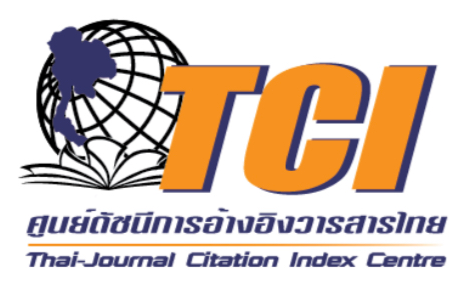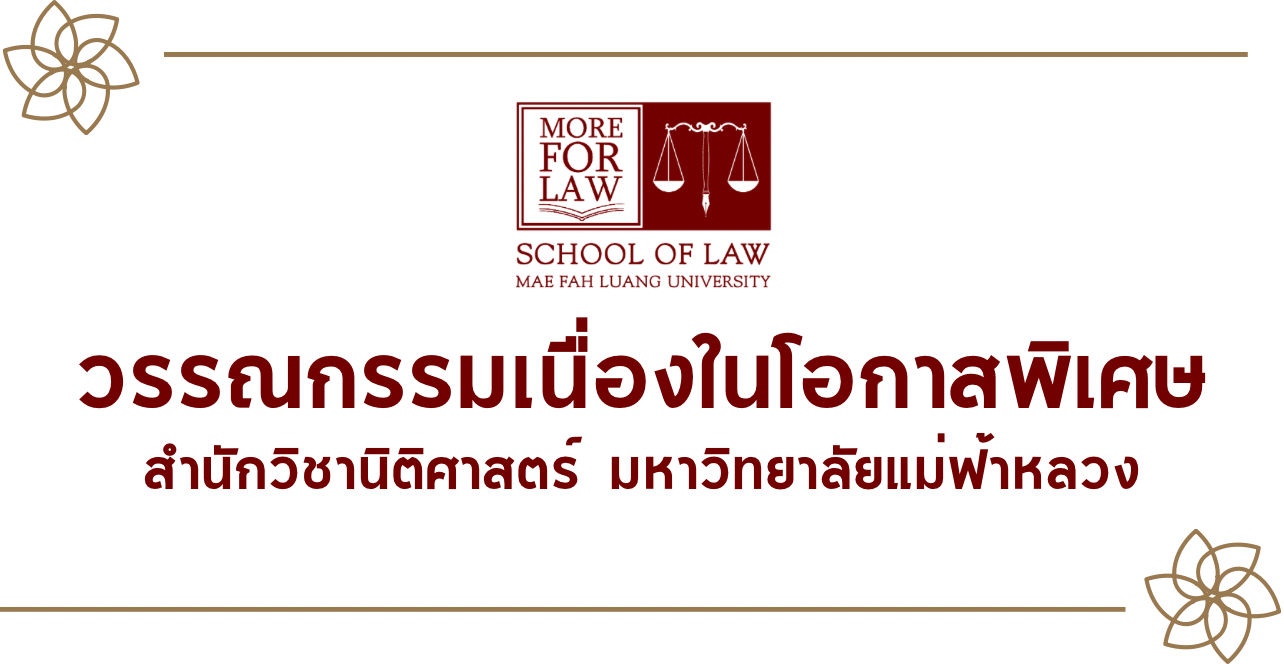Does the Thai Copyright Law Permit Courts to Create New Exceptions to Copyright Infringement?
DOI:
https://doi.org/10.14456/mfulj.2021.7Keywords:
Article 9 (2) of the Berne Convention (Paris Act), Article 13 of TRIPS Agree-ment, ection 32 of Copyright Act, B.E. 2547 (as amended), Exceptions to Copyright Infringement, Fair UseAbstract
In this article, the author attempts to determine whether the Copyright Act, B.E. 2537 (as amended) permits Thai courts to create new exceptions to copyright infringement, focusing on Section 32 of the Act.
To make the above-mentioned consideration more complete, the author refers to the three conditions on copyright exceptions stipulated in the Berne Convention (Paris Act, 1971), Article 9 (2), and the TRIPS Agreement, Article 13 (or the so-called “3-Step Test”), as these two international agreements bind Thailand. Additionally, due to the lack of binding guidelines on how to apply the 3-Step Test to the conditions or transform them into national laws, the author deems it necessary to make reference to the opinion rendered by the WTO Panel on United States – Section 110 (5) of the US Copyright Act (WT/DS160/R, 15 June 2000) and the explanations on the 3-Step Test. The explanations are contained in a Handbook on the WTO TRIPS Agreement (2020) and the Guide to the Berne Convention for the Protection of Literary and Artistic Works (Paris Act, 1971).
The result of this analysis has led the author to conclude that the Copyright Act does not grant Thai courts latitude to interpret it broadly. Based on this conclusion, the author suggests that, as long as amendment to the Copyright Act is pending, if there is any dispute, the defendant should look to the explicitly stated existing exceptions for legal authority.
Downloads
References
พระราชบัญญัติคุ้มครองวรรณกรรมและศิลปกรรม พุทธศักราช 2474
พระราชบัญญัติลิขสิทธิ์ พ.ศ. 2521
พระราชบัญญัติลิขสิทธิ์ พ.ศ. 2537 ตามที่แก้ไขแล้ว
คำพิพากษาศาลฎีกาที่ 5843/2543
คำพิพากษาศาลทรัพย์สินทางปัญญาและการค้าระหว่างประเทศกลาง คดีหมายเลขดำที่ ทป. 145/2545 คดีหมายเลขแดงที่ ทป. 116/2546
กรมทรัพย์สินทางปัญญา, คู่มือการใช้งานลิขสิทธิ์ที่เป็นธรรม [ออนไลน์], แหล่งที่มา:http://www.ipthailand.go.th/images/781/manual_copyright.pdf
ปริญญา ดีผดุง, ปัญหาการคุ้มครองสิทธิตามกฎหมายลิขสิทธิ์, เอกสารประกอบการบรรยายโครงการอบรมหลักสูตรพิเศษ ประกาศนียบัตรกฎหมายทรัพย์สินทางปัญญา รุ่นที่ 3, สํานักอบรมศึกษากฎหมายแห่งเนติบัณฑิตยสภา, 9 เมษายน - 16 พฤษภาคม 2547.
พิศวาท สุคนธพันธุ์ และณัฐพงศ์ สุวรรณอินทร์, การล้อเลียนงานอันมีลิขสิทธิ์กับกฎหมายลิขสิทธิ์ไทย: กรณีศึกษาปัญหาการตีความว่าด้วยการใช้งานที่เป็นธรรม, วารสารรามคำแหง ฉบับนิติศาสตร์, ปีที่ 9 ฉบับที่ 2 (กรกฎาคม - ธันวาคม 2563).
สมชาย รัตนชื่อสกุล, การแปรรูปสัมบูรณ์ในงานอันมีลิขสิทธิ์: ข้อพิจารณาจากคดีกูเกิ้ล (Transformation on Copyright Work: Consideration from the Google’s Case, วารสารวิชาการ คณะนิติศาสตร์ มหาวิทยาลัยหอการค้าไทย, ปีที่ 8 ฉบับที่ 1 (มิถุนายน 2559): 148, 167. [ออนไลน์] แหล่งที่มา: http://utcc2.utcc.ac.th/lawjournal/81/Somchai.pdf
อรพรรณ พนัสพัฒนา, คำอธิบายกฎหมายลิขสิทธิ์, พิมพ์ครั้งที่ 6 (กรุงเทพมหานคร: สำนักพิมพ์แห่งจุฬาลงกรณ์มหาวิทยาลัย, 2557).
World Trade Organization, Agreement on Trade-Related Aspects of Intellectual Property Rights (TRIPS Agreement) that is Annex 1C of the Marrakesh Agreement Establishing the World Trade Organization, signed in Marrakesh, Morocco on 15 April 1994 [Online], Source: https://www.wto.org/english/docs_e/legal_e/27-trips_01_e.htm
World Intellectual Property Organization, Berlin Act, 1908 Revised Berne Convention for the Protection of Literary and Artistic Works of November 13, 1908 and Berne Additional Protocol, 1914 Additional Protocol to the Revised Berne Convention of November 13, 1908 of March 20, 1914 [Online], Source: https://www.wipo.int/edocs/pubdocs/en/wipo_pub_berne_birpi.pdf
World Intellectual Property Organization, Berne Convention for the Protection of Literary and Artistic Works, Paris Act (1971) [Online]. Source: https://wipolex.wipo.int/en/text/283698
US Copyright Office, Chapter 1: Subject Matter and Scope of Copyright [Online], Source: https://www.copyright.gov/title17/92chap1.html
Justia, The Authors Guild Inc., et al. v. Google, Inc., No. 12-3200 (2d Cir. 2013) [Online], Source: https://law.justia.com/cases/federal/appellate-courts/ca2/12-3200/12-3200-2013-07-01.html
Justia, Campbell v. Acuff-Rose Music, 510 U.S. 569 (1994) [Online], Source: https://supreme.justia.com/cases/federal/us/510/569/case.pdf
Supreme Court of the United States, Google LLC v. Oracle America, Inc., 593 U.S. _______ (2021) (U.S. Supreme Court; decided on 5 April 2021) [Online], Source: https://www.supremecourt.gov/opinions/20pdf/18-956_d18f.pdf
Nandana Indananda and Suebsiri Taweepon, Fair Use: A Narrow Exception to Copyright Infringement in Thailand [Online], Source: https://www.tilleke.com/resources/fair-use-narrow-exception-copyright-infringement-thailand
World Intellectual Property, Guide to the Berne Convention for the Protection of Literary and Artistic Works (Paris Act, 1971) [Online], Source: https://www.wipo.int/edocs/pubdocs/en/copyright/615/wipo_pub_615.pdf
World Trade Organization, A Handbook on the WTO TRIPS Agreement, 2nd Edition, (Cambridge: 2020), (edited by Antony Taubman, Hannu Wager, and Jayashree Watal).
World Trade Organization, Report of the WTO Panel on (the Case of) Unites States – Section 110 (5) of the US Copyright Act (WT/DS160/R, 15 June 2000) [Online], Source: https://www.wto.org/english/tratop_e/dispu_e/1234da.pdf
Downloads
Published
How to Cite
Issue
Section
License
Copyright (c) 2021 Mae Fah Luang University Law Journal

This work is licensed under a Creative Commons Attribution-NonCommercial-NoDerivatives 4.0 International License.






